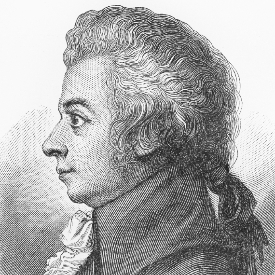
Drawing of Mozart in silverpoint, made by Dora Stock during Mozart's visit to Dresden, April 1789. Public domain.
Wolfgang Amadeus Mozart
Composer
Biography
Wolfgang Amadeus Mozart
Wolfgang Amadeus Mozart (1756–1791) was an Austrian composer whose extraordinary talent reshaped the course of Western music. Born in Salzburg, he displayed prodigious musical abilities from an early age, composing his first pieces at the age of five and astonishing Europe as a child performer. His father, Leopold Mozart, a respected violinist and composer, recognized his son’s genius and dedicated himself to nurturing Wolfgang’s career, traveling with him and his sister Nannerl across Europe to perform for royal courts and influential patrons.
By his teenage years, Mozart was already writing symphonies, operas, and concertos that revealed remarkable maturity. He absorbed diverse musical styles from Italy, France, and Germany, blending them into his own voice. His early operas, such as Mitridate, re di Ponto and Lucio Silla, brought him recognition in Italy, while his sacred music and symphonies were celebrated in Salzburg. Yet Mozart sought broader opportunities, yearning to escape the limitations of his provincial post as a court musician.
In 1781, after a quarrel with his employer, the Archbishop of Salzburg, Mozart settled in Vienna, where he built his career as a freelance composer and performer—an unusual and risky path in the 18th century. Vienna became the fertile ground for his most enduring works, including piano concertos that showcased his brilliance both as composer and performer. His friendships and rivalries with other composers, including Joseph Haydn and Antonio Salieri, sharpened his artistry and expanded his influence in the city’s vibrant musical culture.
Mozart’s operas from the 1780s revolutionized the art form with their depth of character and seamless blend of drama and music. Works such as The Marriage of Figaro (1786), Don Giovanni (1787), and Così fan tutte (1790) combined comic elements with profound insights into human relationships. In collaboration with librettist Lorenzo Da Ponte, Mozart elevated opera buffa to new dramatic heights. He also produced timeless instrumental works during this period, including the Jupiter Symphony, his string quintets, and several piano concertos that remain cornerstones of the repertoire.
Despite his artistic triumphs, Mozart’s life was marked by financial struggles and personal challenges. He and his wife, Constanze Weber, had six children, though only two survived infancy. His lavish lifestyle, coupled with the precarious nature of freelance work, often left him in debt. Nonetheless, he continued to compose with astonishing speed and creativity, leaving behind masterpieces such as the Clarinet Concerto (1791) and the unfinished Requiem Mass, which became surrounded by myth and legend after his untimely death.
Mozart died in Vienna at the age of 35, leaving the world bereft of one of its greatest musical minds. In his short life, he composed over 600 works, including symphonies, operas, chamber music, choral works, and concertos. His music remains celebrated for its melodic beauty, structural perfection, and emotional depth. Today, Wolfgang Amadeus Mozart is remembered not only as a towering figure of the Classical era but also as a universal symbol of human creativity and artistic genius.
Shows
Shows associated with Wolfgang Amadeus Mozart
Songs
Songs from shows associated with Wolfgang Amadeus Mozart
Videos
Videos associated with Wolfgang Amadeus Mozart
Quizzes
Quizzes associated with Wolfgang Amadeus Mozart
Learning Modules
Learning modules associated with Wolfgang Amadeus Mozart
Additional Information
N/A